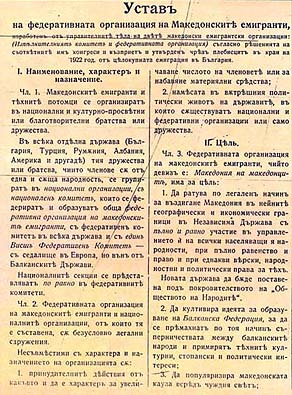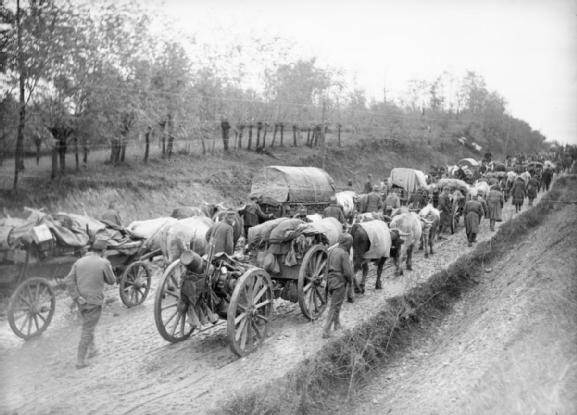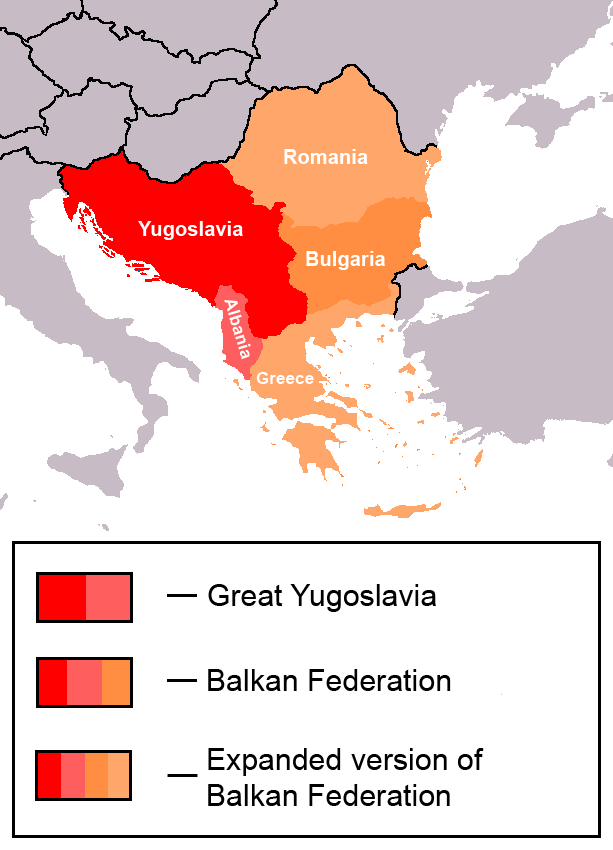|
Todor Panitsa
Todor Nikolov Panitsa ( bg, Тодор Николов Паница) (July 2, 1879 Oryahovo, Bulgaria – May 7, 1925 Vienna, Austria) was a Bulgarian revolutionary figure, active in the region of Macedonia. He was one of the leaders of the left wing of the Internal Macedonian Revolutionary Organization. Biography Panitsa was born in Oryahovo, northwestern Bulgaria, a town located on the right bank of the Danube. He grew up in the family of Nikola Panitsa from Tarnovo and Mitanka Peltekova from Svishtov. Panitsa studied in Lom, where he was attracted to the Macedonian liberation movement. Later he remained an orphan and was raised by his uncle in Varna. Three years Panitsa served as a cavalryman in the Bulgarian army. At the end of 1902 he became an activist of IMRO. Then Panitsa joined the band of Nikola Pushkarov and participated in the Ilinden uprising as rebel in Skopje region. After the uprising he arrived in Varna, Bulgaria. In 1904 Panitza went back to Ottoman Macedonia ... [...More Info...] [...Related Items...] OR: [Wikipedia] [Google] [Baidu] |
Oryahovo
Oryahovo ( bg, Оряхово ) is a port city in northwestern Bulgaria, part of Vratsa Province. It is located in a hilly area on the right bank of the Danube, just east of the mouth of the river Ogosta, a few more kilometres downstream from where the Jiu flows into the Danube on Romanian territory. The town is known for the ferry service that connects it to the Romanian town of Bechet across the river. There are also plans by local private companies for a bridge across the Danube. History Ancient history and Middle Ages The town's name has evolved through the course of history, with names such as ''Vrhov'', ''Orezov'', ''Oreov'' and ''Rahovo'' being mentioned in documents until the current one was officially established in 1886. The area around Oryahovo has been inhabited since ancient times, as archaeological research has proven with findings from the early Neolithic to the Late Middle Ages. A fortress called ''Kamaka'' (), which existed from the 9th to the 14th century, i ... [...More Info...] [...Related Items...] OR: [Wikipedia] [Google] [Baidu] |
Boris Sarafov
Boris Petrov Sarafov (Bulgarian and mk, Борис Петров Сарафов) (12 June 1872 in Libyahovo, Salonica Vilayet, Ottoman Empire, present-day Bulgaria – 28 November 1907 in Sofia, Bulgaria) was a Bulgarian Army officer and revolutionary, one of the leaders of Supreme Macedonian-Adrianople Committee (SMAC) and Internal Macedonian Revolutionary Organization (VMORO). He is considered an ethnic Macedonian in North Macedonia, having identified occasionally as a Macedonian in his life. Biography Boris Sarafov was born in 1872, in village Libyahovo (today Ilinden), Nevrokop region, in the Salonica Vilayet of the Ottoman Empire. He grew up schooled through the Bulgarian Exarchate's school in Nevrokop and the Bulgarian Men's High School of Thessaloniki. Later Sarafov attended the Military School of His Majesty in Sofia, capital of the recently created Principality of Bulgaria. His training in this institution ended in 1894. Afterwards he worked for a short period o ... [...More Info...] [...Related Items...] OR: [Wikipedia] [Google] [Baidu] |
Aleksandar Stamboliyski
Aleksandar Stoimenov Stamboliyski ( bg, Александър Стоименов Стамболийски; 1 March 1879 – 14 June 1923) was the prime minister of Bulgaria from 1919 until 1923. Stamboliyski was a member of the Agrarian Union, an agrarian peasant movement which was not allied to the monarchy, and edited their newspaper. He opposed the country's participation in World War I and its support for the Central Powers. In a famous incident during 1914 Stamboliyski's patriotism was challenged when members of the Bulgarian parliament questioned whether he was Bulgarian or not, to which he shouted in response "At a moment, like the current, when our brothers South Slavs are threatened, I am neither a Bulgarian nor a Serb, I am a South Slav!". This statement relates to his belief in a Balkan Federation which would unite the region and supersede many of the national identities which existed at the time. He was court-martialed and sentenced to life in prison in 1915 due to ... [...More Info...] [...Related Items...] OR: [Wikipedia] [Google] [Baidu] |
Macedonian Federative Organization
The Macedonian Federative Organization (MFO) (Bulgarian and Macedonian: Македонска федеративна организация/организација (MFO/МФО) ) was established in Sofia in 1921 by former Internal Macedonian Revolutionary Organization (IMRO) left wing's activists. History Background Reestablished in 1920, the IMRO became a formidable organization, with Pirin Macedonia as its stronghold. From its secure bases in Bulgaria it launched armed attacks and propaganda campaigns into Northern Greece and Vardar Banovina. Although it appeared as well organized group, it had its own left wing. In the early 1920s, the IMRO split over the ultimate goal of its activity. The right faction led by Alexandar Protogerov sought incorporation of all Macedonian territory into Bulgaria, while the left faction sought an autonomous Macedonia that could join Balkan Federative Republic. In December 1921, left-leaning deserters formed the official ''Macedonian Emigre's Fed ... [...More Info...] [...Related Items...] OR: [Wikipedia] [Google] [Baidu] |
Drama, Greece
Drama ( el, Δράμα ) is a city and municipality in Macedonia, northeastern Greece. Drama is the capital of the regional unit of Drama which is part of the East Macedonia and Thrace region. The city (pop. 55.593 2021 censuis the economic center of the municipality (pop. 58,944), which in turn comprises 60 percent of the regional unit's population. The next largest communities in the municipality are Choristi (pop. 2,725), Χiropótamos (2,554), Kallífytos (1,282), Kalós Agrós (1,178), and Koudoúnia (996). Built at the foot of mount Falakro, in a verdant area with abundant water sources, Drama has been an integral part of the Hellenic world since the classical era; under the Byzantine Empire, Drama was a fortified city with a castle and rose to great prosperity under the Komnenoi as a commercial and military junction. During the Ottoman era, tobacco production and trade, the operation of the railway (1895) and improvement of the road network towards the port of Kavala, ... [...More Info...] [...Related Items...] OR: [Wikipedia] [Google] [Baidu] |
Battle Of Krivolak
The Battle of Krivolak (in bg, Криволашко сражение, Битка при Криволак) was a World War I battle, fought between 21 October and 22 November 1915. The battle was fought in the initial stage of the Macedonian campaign, in the Balkans Theatre. On October 21, Bulgarian troops attacked the French-held positions near the Strumica rail station, at the time part of the Kingdom of Serbia (present day North Macedonia), starting the battle. Fighting continued until November 22, when two Serbian divisions failed to capture Skopje, thus rendering the continuation of Entente offensive operations dangerous and forcing the French to evacuate their forces from the region. The Entente defeat at Krivolak and the follow–up battle of Kosturino led to the complete withdrawal of Allied forces from Serbia, thus enabling the Central Powers to re-open the Berlin to Constantinople rail line. The Allies in the meantime consolidated their defenses in Greece. Prelude The ... [...More Info...] [...Related Items...] OR: [Wikipedia] [Google] [Baidu] |
First World War
World War I (28 July 1914 11 November 1918), often abbreviated as WWI, was one of the deadliest global conflicts in history. Belligerents included much of Europe, the Russian Empire, the United States, and the Ottoman Empire, with fighting occurring throughout Europe, the Middle East, Africa, the Pacific, and parts of Asia. An estimated 9 million soldiers were killed in combat, plus another 23 million wounded, while 5 million civilians died as a result of military action, hunger, and disease. Millions more died in genocides within the Ottoman Empire and in the 1918 influenza pandemic, which was exacerbated by the movement of combatants during the war. Prior to 1914, the European great powers were divided between the Triple Entente (comprising France, Russia, and Britain) and the Triple Alliance (containing Germany, Austria-Hungary, and Italy). Tensions in the Balkans came to a head on 28 June 1914, following the assassination of Archduke Franz Ferdina ... [...More Info...] [...Related Items...] OR: [Wikipedia] [Google] [Baidu] |
Balkan Wars
The Balkan Wars refers to a series of two conflicts that took place in the Balkan States in 1912 and 1913. In the First Balkan War, the four Balkan States of Greece, Serbia, Montenegro and Bulgaria declared war upon the Ottoman Empire and defeated it, in the process stripping the Ottomans of its European provinces, leaving only Eastern Thrace under the Ottoman Empire's control. In the Second Balkan War, Bulgaria fought against the other four original combatants of the first war. It also faced an attack from Romania from the north. The Ottoman Empire lost the bulk of its territory in Europe. Although not involved as a combatant, Austria-Hungary became relatively weaker as a much enlarged Serbia pushed for union of the South Slavic peoples. The war set the stage for the Balkan crisis of 1914 and thus served as a "prelude to the First World War". By the early 20th century, Bulgaria, Greece, Montenegro and Serbia had achieved independence from the Ottoman Empire, but large eleme ... [...More Info...] [...Related Items...] OR: [Wikipedia] [Google] [Baidu] |
31 March Incident
The 31 March Incident ( tr, 31 Mart Vakası, , , or ) was a political crisis within the Ottoman Empire in April 1909, during the Second Constitutional Era. Occurring soon after the 1908 Young Turk Revolution, in which the Committee of Union and Progress (CUP) had successfully restored the Constitution and ended the absolute rule of Sultan Abdul Hamid II, it is sometimes referred to as an attempted countercoup or counterrevolution. It consisted of a general uprising against the CUP within Istanbul, largely led by reactionary groups, particularly Islamists opposed to the secularising influence of the CUP and supporters of absolutism, although liberal opponents of the CUP within the Ottoman Liberty Party also played a lesser role. The crisis ended after eleven days, when troops loyal to the CUP restored order in Istanbul. The crisis began with a mutiny among elite Macedonian troops of the Istanbul garrison on the night of 12–13 April ( R.C. 30–31 March) 1909, sparked by agitatio ... [...More Info...] [...Related Items...] OR: [Wikipedia] [Google] [Baidu] |
Balkan Socialist Federation
The Balkan Federation project was a left-wing political movement to create a country in the Balkans by combining Yugoslavia, Albania, Greece, Bulgaria, Romania and Turkey. The concept of a Balkan federation emerged in the late 19th century from among left political forces in the region. The central aim was to establish a new political unity: a common federal republic unifying the Balkan Peninsula on the basis of internationalism, socialism, social solidarity, and economic equality. The underlying vision was that despite differences among the Balkan peoples the historical need for emancipation was a common basis for unification. This political concept went through three phases in its development. In the first phase the idea was articulated as a response to the collapse of the Ottoman Empire at the beginning of the 20th century. In the second phase, mostly through the interwar period (1919–1936), the idea of the Balkan federation was taken up by the Balkan Communist parties. The ... [...More Info...] [...Related Items...] OR: [Wikipedia] [Google] [Baidu] |
People's Federative Party (Bulgarian Section)
250px, Dimo Hadzhidimov, Todor Panitsa and Yane Sandanski">Todor_Panitsa.html" ;"title="Dimo Hadzhidimov, Todor Panitsa">Dimo Hadzhidimov, Todor Panitsa and Yane Sandanski with the Young Turks The People's Federative Party (Bulgarian Section) ( bg, Народна федеративна партия (българска секция)) was a Bulgarian political party in the Ottoman Empire, created after the Young Turk Revolution, by members of the left wing of the Internal Macedonian Adrianople Revolutionary Organization (IMARO). The party functioned for one year from August 1909 until August 1910. The Party decided to name itself ''Bulgarian Section'', since it was hoped that other nationalities from European Turkey would adopt its program and form their own ethnic sections, but this didn't happen. Its main political rival was the Union of the Bulgarian Constitutional Clubs. Origins The Kyustendil congress of IMARO in 1908 led to a disintegration of the organization - Yane S ... [...More Info...] [...Related Items...] OR: [Wikipedia] [Google] [Baidu] |
Ottoman Empire
The Ottoman Empire, * ; is an archaic version. The definite article forms and were synonymous * and el, Оθωμανική Αυτοκρατορία, Othōmanikē Avtokratoria, label=none * info page on book at Martin Luther University) // CITED: p. 36 (PDF p. 38/338) also known as the Turkish Empire, was an empire that controlled much of Southeast Europe, Western Asia, and Northern Africa between the 14th and early 20th centuries. It was founded at the end of the 13th century in northwestern Anatolia in the town of Söğüt (modern-day Bilecik Province) by the Turkoman tribal leader Osman I. After 1354, the Ottomans crossed into Europe and, with the conquest of the Balkans, the Ottoman beylik was transformed into a transcontinental empire. The Ottomans ended the Byzantine Empire with the conquest of Constantinople in 1453 by Mehmed the Conqueror. Under the reign of Suleiman the Magnificent, the Ottoman Empire marked the peak of its power and prosperity, as well a ... [...More Info...] [...Related Items...] OR: [Wikipedia] [Google] [Baidu] |








